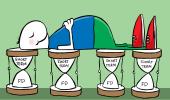Bundled products often come with restrictions.
The customer also gets locked into two products at the same time. This reduces flexibility.

The Securities and Exchange Board of India recently directed mutual funds to stop offering bundled products.
In future, even if you sign up for a long-term systematic investment plan, you will not be offered free life insurance.
The financial landscape, however, is full of bundled products.
Customers should study their fine print before deciding to rely on them.
Two types of bundling
Bundling happens at two levels. One is when the product manufacturer offers free additional benefits that are not a standard feature of the core offer.
For example, a credit card may offer personal accident insurance to the primary cardholder, or a bank fixed deposit may come with life insurance (for a stipulated period) equal to the deposited amount.
In these cases, the product manufacturer pays the premium, or includes it in the core product's pricing.
The second type of bundling happens when the manufacturer offers multiple products or benefits under one umbrella.
For example, when you sign up for a home loan, the bank may offer reducing term insurance cover to take care of the loan obligation in case the borrower dies.
A personal accident insurance policy could offer reimbursement benefits if hospitalisation occurs due to an accident.
In all these cases, an additional premium is charged.
Unit-linked insurance plans (Ulips), which combine life insurance with market-linked investments, are among the most popular bundled products.
Greater convenience
Bundled products offer a one-stop solution.
"They offer convenience, and at times, cost savings. The customer gets two benefits in one product," says Santosh Joseph, founder and managing partner, Germinate Investor Services LLP.
Instead of filling in application documents and doing the KYC (know your customer) twice, they have to do so only once.
Sometimes the manufacturer bears a portion of the product cost.
Limited benefits, lower flexibility
Bundled products, however, often come with restrictions.
"As they are complimentary in nature, there are always caps on the maximum benefit they can provide. Hence, it is difficult to imagine a bundled product fulfilling a customer's primary needs," says Arvind A Rao, founder, Arvind Rao and Associates.
The customer also gets locked into two products at the same time. This reduces her flexibility.
"The customer will be forced to discontinue the overall product even if one of them does not work well. Hence, one should be judicious about using bundled products," says Anil Rego, founder and CEO, Right Horizons.
Hidden conditions
The free features sometimes come with conditions attached. For instance, insurance cover could cease at a certain age.
Product manufacturers sometimes mention in the fine print that they have the right to stop offering the free features at any point, and they do so occasionally.
"There could be riders and preconditions linked to the duration or the quantum of the benefit. These could catch the customer off guard," says Joseph.
Understand the fine print of these offers.
"Most credit cards, for instance, bundle accidental insurance, or insurance for baggage loss, etc. However, they come with a lot of exclusions that the customer should be aware of," says Rego.
Is it the right fit?
Buy a two-in-one product only if it is relevant for you. A personal accident policy may offer hospitalisation benefit after charging an extra premium.
However, the sum insured could be inadequate, ranging from Rs 50,000 to Rs 5 lakh.
Customers would be better off purchasing a standalone health insurance policy, which would cover hospitalisation for any reason, including accident.
"A bundled product sometimes creates the perception that a particular need has been met, when in reality the complimentary benefit may be very low," says Rao.
Life and health insurance are non-negotiable products.
"Evaluate life and health cover needs as part of your financial planning. While you could use some bundled products, you shouldn't rely entirely on them," says Rego.
Adds Joseph: "Discerning customers should buy separate products. They may be more expensive, but they also offer higher benefits."
- If life insurance cover in a bundled product terminates when you have reached an advanced age, you may find it difficult to buy a new one.
- Banks reserve the right to withdraw group health cover offered to their deposit customers at any point, which could put you in a spot/
- At times, the premium of group cover can undergo a steep hike
- If you had bought the cover for your home loan by paying a lump sum premium, you will lose out on it if you do a balance transfer/
- Examine the cost: Bundled products like Ulips initially had large costs.













 © 2025
© 2025